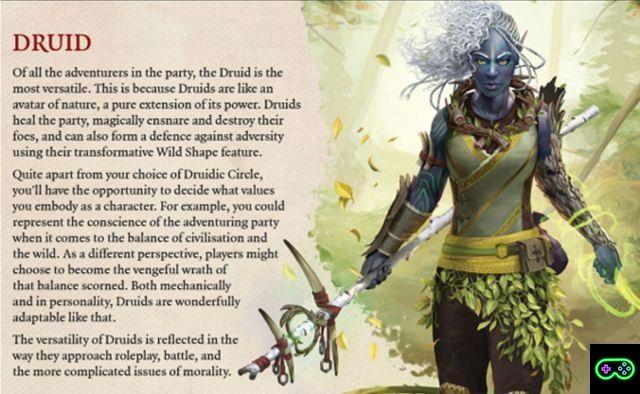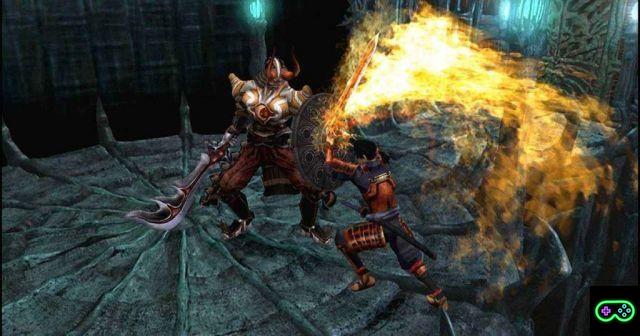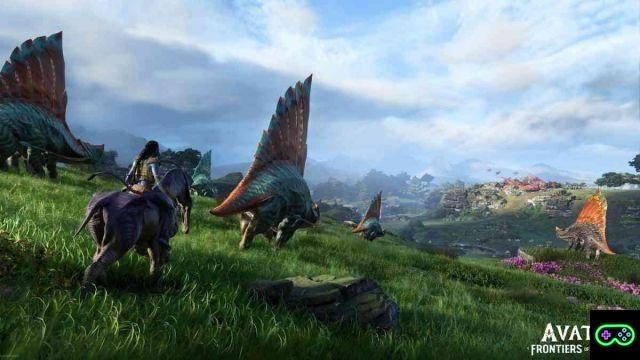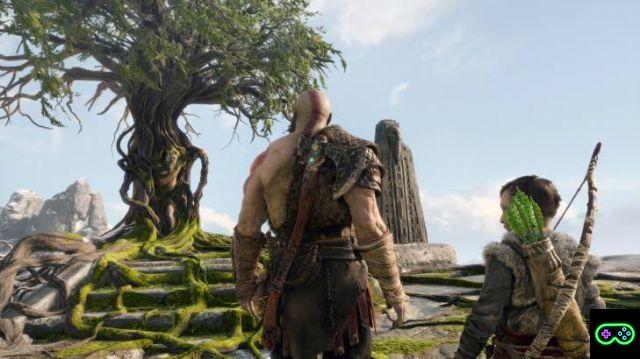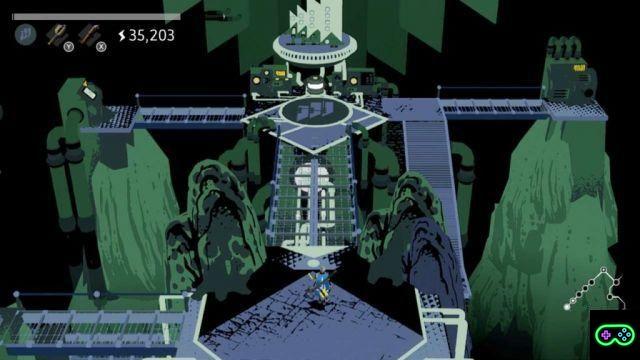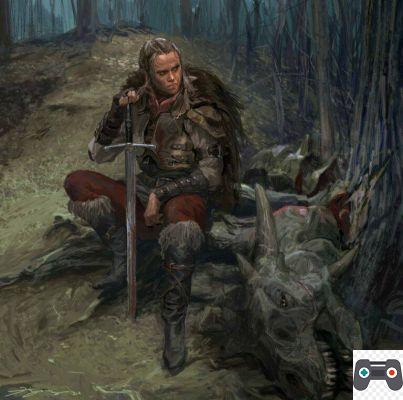There are many video games inspired by ancient Rome, especially on PC, where the strategic genre lends itself well to a historical setting such as that of the Roman Empire, with its numerous, huge pitched battles.
With a background as a mostly console player, I had never put my hand on one of these titles; my only foray into videogame Rome was constituted by shadow of rome, an action adventure that alternated exploratory phases in the imperial capital with combat phases in the gladiatorial arenas.
That game 100% embodied the concept of title AA: a medium budget product, with a concept of attractive but limited game design in its realization, afflicted by a certain basic repetitiveness and therefore suitable for impromptu game sessions, or as a lightening after completing a title of higher caliber.
Apply this same definition also to Expeditions: Rome it would certainly not be wrong, but it would still be ungenerous: it is a title with limits and not without defects, a medium-level production that adds little to the genre of reference; and yet we cannot escape how much good there is in this title, and how much its merits contribute to making it an enjoyable, long-lasting, and demanding enough to be rewarding play experience.
Beyond the Rubicon
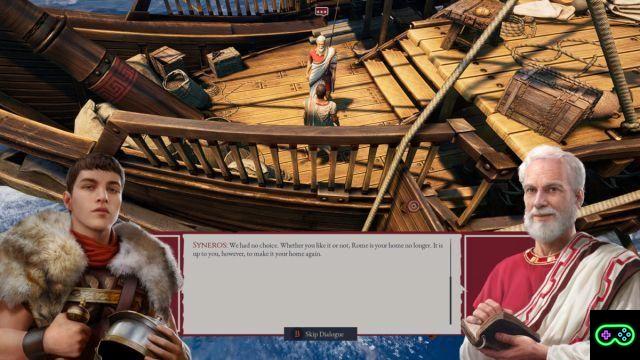
Developed by the Danish studio Logic Artists and distributed by THQ Nordic, Expeditions: Rome è il third installment in the Expeditions tactical RPG series. The games feature settings and stories that are unrelated to each other (the first, Conqueror, addresses the Spanish conquests in America in the sixteenth century; The second one, Viking, instead presents the scenario of the Viking invasion of England), so that it is not absolutely necessary to recover the previous titles to enjoy this.
In the game we will play the role of a young scion of a Roman noble family, fallen victim to palace games: a mysterious principal has murdered our father and kidnapped our sister, so that our mother has sent us far away, by sea, in the hope of escaping the massacre. Under the protective wing of our philosopher servant Syneros, we will enlist in the imperial army, engaged in a campaign of conquest in Asia Minor.
This will be just the premise of one very complex story that will unfold over the course of 3 long military campaigns (in addition to Asia, Egypt and Gaul, obviously passing through Rome caput mundi) and will lead us to confront with historical figures of the caliber of Cicero, Cleopatra and Vercingetorix, just to name a few: a joy for all lovers of ancient history, who will attend one historical reinterpretation of famous events for the evolution of Rome from the late Republic of the first century BC to the birth of the Empire.
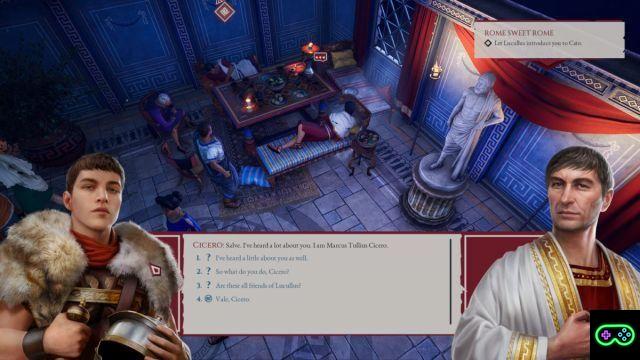
The narrative is perhaps the best aspect of the game: always varied, articulated in the writing of the main characters and their motivations, it is a captivating mix of political intrigue and cliché of a warrior epic. The dialogues are fully dubbed (in English), another point in favor of the player's involvement, and the desire to know "how will it end?" it's the fuel that drives the game for over 50 hours to complete the main quest (I spent 63 hours taking all the time in the world to complete most of the side assignments).
As a good Western RPG, Expeditions: Rome foresees a branching of the narrative tracks as a consequence of the choices made by the player: whether they are dialogic (with options that vary according to the character traits of the protagonist, chosen during the character creation phase) or pragmatic (kill or spare life, bargain or extort, betray or be loyal), the choices we are called to perform will be proposed throughout the game, and they will have more or less important and more or less long-term consequences, which denotes an accurate planning in the writing phase of the numerous possible outcomes of our decisions.
It goes without saying that the personality of the protagonist we are going to define at the beginning of the game cannot be completely distorted: some choices of dialogue or action will be precluded to us, depending on whether we have chosen to prefer logic, violence or dialectics as ours. privileged method of interaction with others. This aspect may appear limiting in some situations, but in general we will always be guaranteed more than a single way of approaching each narrative node, so that we will never feel victims of forced choices.
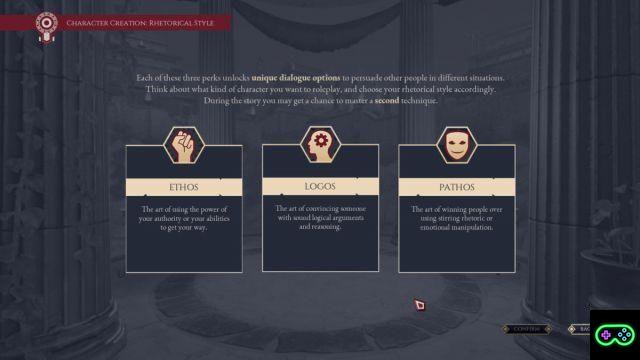
Remaining on the theme of character creation, it is a lean preparatory phase, characterized by the absence of classic paper RPG parameters: in short, no attributes to enhance, but combat classes to choose from and consequent branches of skills to be unlocked via level up. The starting class, ours and those of the companions who will support us in the adventure, cannot be changed (we can only choose that of our protagonist, without the possibility of changing it later), but each branch of the skills is freely pursued and completed.
For example, the Veles class (light infantry) has the Assassin, Duelist and Thumper branches: each branch includes active and passive skills. The choice of whether to focus on mastering a specific branch or opting for a mix of skills from different branches is totally in the player's hands., with the caveat that high-level skills will only unlock by investing a certain number of skill points in a specific branch. In short, the game seems to direct the player towards specialization rather than pout-pourri, but the advice is still to experiment with various combinations, you could discover some really lethal ones! However, it will be necessary to use some reasoning in the choices by virtue of the fact that we will only be able to "equip" a maximum of 6 skills active in battle.

The choice to eliminate the classic attributes of strength, dexterity, etc., elements present in the previous titles of the series, can make the maniacs of parametric management turn up their noses. However, it is a choice consistent with the underlying philosophy of the title, which seeks to combine strategic depth with gameplay immediacy.
As we will see, this choice pays in terms of accessibility but not in that of the game structure, which is incapable of emancipating itself from an underlying repetitiveness that marks the entire experience.
Come, Yep, Vici
macro
As mentioned, Expeditions: Rome consists of 3 major military campaigns: Asia Minor, Egypt and North Africa, Gaul. As legion commanders, we will have the task of defeating the opposing armies and advancing in the conquest of these immense territories, for our glory and that of Rome. Here the strategic mechanics of the title are expressed.
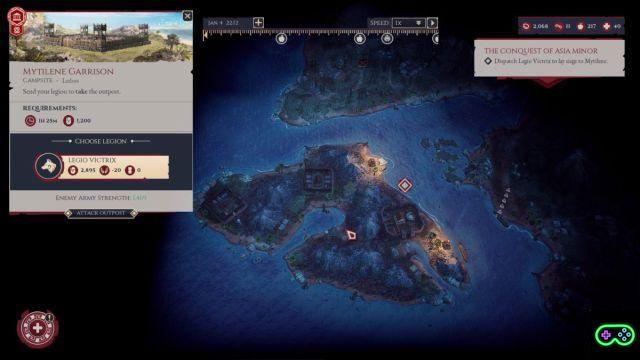
Each of these regions is divided into sectors, each containing resources to draw upon, enemy strongholds to conquer, and other hotspots. Every operation involving the legion has the castrum, the base camp, as its center of operations where the legion is based: in this place we can talk to our comrades and subordinates, order the construction of various types of improvements, trade, recruit troops and officers and more. All preparatory activities for our campaign of conquest: if our army is too weak it will not be able to conquer anything, let alone free territories occupied by enemies; if he does not have slaves, he will not be able to build any improvements; and if he doesn't have enough food, men could start dying of starvation! In short, the resources we have at our disposal are constantly consumed, at precise daily rhythms, so as to make a continuous activity of conquest and consolidation necessary.
In the main map we will be able to move both the legion and our protagonist at any time. While with the latter we can proceed in any direction, and in fact we will be pushed to explore the still unknown portions of the map, our legion will have to be sent on missions geared towards specific objectives: take possession of an abandoned mine; plucking a source of timber from the enemy army; besiege an enemy stronghold. Each mission that we will entrust to our Legion will start from the castrum, and will return to it once the expedition is completed; only then will we be able to assign a new mission to our men, and so on. Obviously, the enemy will not wait to be killed, and will organize punitive or reconquest expeditions from time to time, for which we will have to be prepared: in the event of defeat, in fact, we will have to steal territories painstakingly conquered with the blood of our soldiers. Conversely, the conquest of an opposing outpost will allow us to carry out a decisive mission of pacification in that region. If successful, the region in question will be permanently placed under our control.
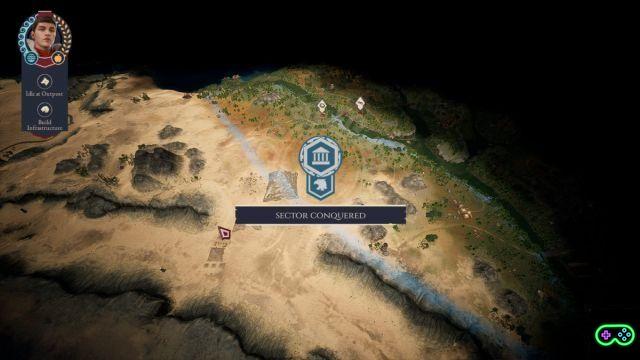
When we send our legion to war, the battles will not be represented with polygonal models, nor conducted by us in real time: we will be offered a stylized representation of the forces at play, e we will have to resolve the conflict by choosing the combat tactics to be adopted in each of the 4 phases of which each skirmish is composed: these tricks will be presented to us in groups of three, among which we can choose only one from time to time; each stratagem has particular effects, from a change in the morale of the troops to the increase in the number of missing and wounded opponents, to the greater percentage of wealth of the final loot.
Once the stratagem has been chosen, we will observe its effect through a non-interactable battle animation, until the choice of the next stratagem: so for 4 times until the end of the a clash that, in addition to victory or defeat, will result in a more or less marked decrease in our attack power (depending on the number of dead, injured and missing), a possible spoils of war or, in the worst cases, the death of one or more of our commanders. The tricks that appear to us from time to time are randomly extracted from a pool that can be increased by some buildable improvements in the castrum, through which we can occasionally obtain "super tricks" with particularly favorable results, to be used in the most demanding skirmishes or in any case when we want victory at all costs. However, they are not reusable, so it will be necessary to choose them with knowledge of the facts.
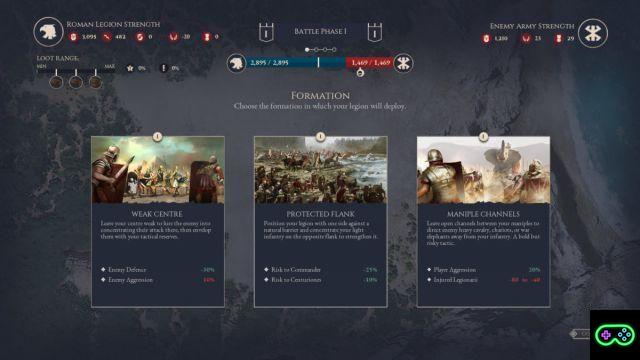
The strategic depth offered by these phases is, unfortunately, only apparent: it will be valid in the very early stages of the game, when you have to practice with various interfaces and parameters, but as soon as we have a minimum of familiarity with the tricks (and a number of decent troops) we will be able to recognize the winning ones in the blink of an eye, with the result of being able to solve every skirmish within a few seconds. In short, there is a certain carelessness in the design of this mechanic, which gives half the game forward would be tedious if it were not tackled so quickly.
Finally, in the world map we will often run into random events: they can cause harm or benefit, often as a consequence of the actions that we will decide to implement following a premise that is offered in textual form (for example: you meet a mysterious individual along the road who beckons you to approach: you ignore him or continue?) When all right, these events can grant us extra resources, money or additional troops; when it goes wrong they can give rise to a battle, cause injuries to one of our characters (who must therefore be treated in the hospital) or make us lose resources.
Even these situations fail to offer who knows what variety, also why they are very few and will inexorably tend to recur cyclically, always the same: once we have learned the action that guarantees us the greatest advantage, it will be enough for us to always use it to always obtain the same positive outcome. In short, even these events end up being a hindrance, a slowdown in our work of territorial conquest which we would have gladly done without and which instead will keep us company for the duration of the adventure.
microphone
The speech changes with the battles involving our party, where it is expressed the heart of Expeditions: Rome's tactical RPG gameplay. These are phased battles, not turn-based: on the battlefield, divided into hexagonal cells like the previous chapters, there will always be at least 2 sides, ours and the opponent's, with the occasional presence of two others, allies and neutrals. The game solves all the moves available to one side and then moves on to another. This means that, within the player phase, we will not have to take actions in a specific order, but we will have total freedom in choosing which action to make which character we want to take and at what time.
As long as a character has action points available, he can act. These points can be spent to move and use one or more skills; or to just move; or to use all the possibilities allowed by that character's action point total. Here tactical thinking is really the master: we will be able to plot complex offensive and defensive maneuvers in the space of a single combat phase, for example by surrounding or closing a group of opponents with pincers, or adopt a hit and run guerrilla made of lightning attacks. and withdraw snapshots.
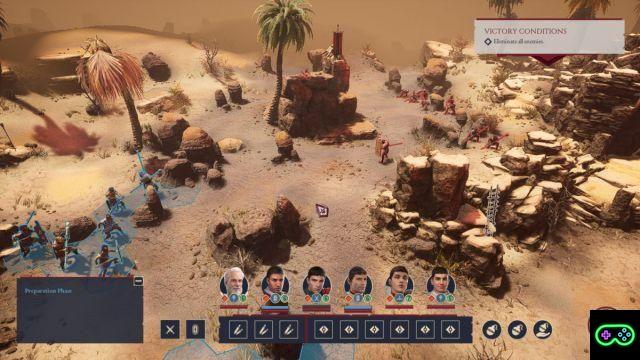
The approaches to battle are very varied, also by virtue of the maps themselves, often developed vertically with consequent bonuses and / or malus deriving from the presence of ranged weapons: archers will have significant bonuses if they manage to earn an elevated point from which to strike, for example for example, even if they will have a cone of shadow in the cells immediately at the foot of their hills. The developers also studied an intelligent positioning of interactable objects within these maps: whether it is oil barrels and torches with which to set fire to entire portions of the map or the enemies themselves; or javelins to throw at armored opponents to break their shields; or even poisonous bombs and clusters of spikes capable of crippling those who walk on them, we will often have the opportunity to suddenly change the configuration of the space on the map and therefore of the balance of power between the deployments. This will allow us to overcome large groups of enemies even with a handful of men, or a not particularly level party.
It should be added then that the battles often have multiple goals, which deviate from the classic "kill all the bad guys": between rescue tasks, position maintenance, infiltration or strategic retreat, the variety is not lacking, and the game succeeds very well in the task of making us sweat every victory and gratifying us for each plan successful.
With regard to the difficulty of the battles, it is wavering: at the beginning of the game you can choose between 4 levels of difficulty, which can also be changed during construction. Then there are a couple of modifiers that can be activated by those in search of strong emotions: Combat Death, or the permadeath of the men who fell in combat, if the bleeding does not stop within a time limit; and Iron Man, which allows only one save slot. At the current stage of the game, I strongly advise against activating this mode due to a considerable number of bugs, including a game breaker I ran into during the review phase and which would have compromised the game in the absence of multiple saves.
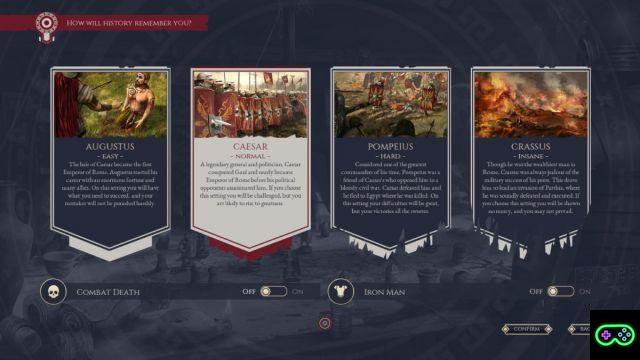
Having carried out the test at normal difficulty, I found the difficulty curve rather inconstant: on average challenging in the first third of the campaign, it progressively lowers so much that from mid-game onwards you proceed a little on autopilot, without worrying excessively about planning and strategies, as long as you have conquered territories and obtained resources and level up regularly. The opponents, in the second part of the adventure, will no longer be at our level in terms of the number of skills available, and will constitute a danger only by virtue of some occasional blow to the kidneys of the AI that will try to make our life difficult with maneuvers. of encirclement and application of negative statuses. To solve this problem, however, it is sufficient to have a couple of healers in your party, more than enough to make most of the enemy maneuvers harmless.
A walk, in short?
Almost, were it not for an absolutely sudden spike in the final stages of the campaign, in one mission in particular that will force us to calculate the moves down to the millimeter to be sure we will be able to complete it. In short, played at normal difficulty the title presents some problems in the balance of its phases, with a balanced opening, a long central part that is too easy and a strangely difficult surge in the final. Nothing unsolvable with some updates, but it would have been better to push less on the customization of the difficulty to file the ascending and descending peaks, thus resulting in an overall more homogeneous gaming experience.
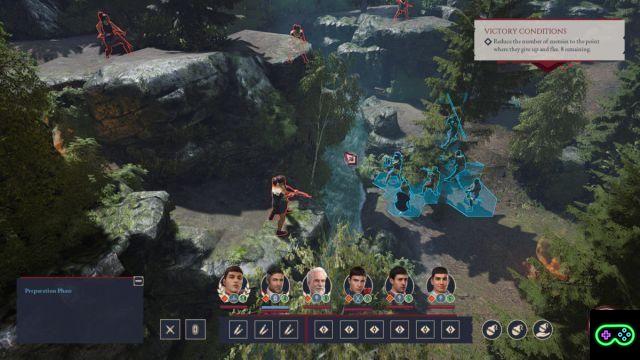
Warriors are divided into quattro classi: Sagittarius (archers), Veles (light infantry), Princeps (heavy infantry) and Triarius (healers). A small variety, however compensated by the numerous branches of skills mentioned above, through which we will be able to shape very versatile characters, also because each can be equipped with two sets of weapons. In addition to the class skills, in fact, there are the combat skills related to each single weapon, very different from each other: single or double hand, throwing or hand to hand, the weapons make up an assortment of swords, daggers, sticks. , bows, spears, shields and more.
There are different degrees of rarity of the weapons, and obviously there are unique ones, often obtainable upon the completion of plot or secondary missions. The weapons are also modifiable, removable and upgradeable, provided you build a forge in the castrum, and upgrade it properly. Each weapon brings specific hits that can be unleashed: they work like skills and we can choose a maximum of 3 per battle, even if the weapon has more. Some of these shots can be used indefinitely, others instead have a limited number of charges, after which we will have to wait for the end of the battle in progress to see them restored (except for particular shots that can recharge in battle under certain conditions). A correct strategy cannot therefore ignore the number and type of shots we have at our disposal, at any moment of the battle.
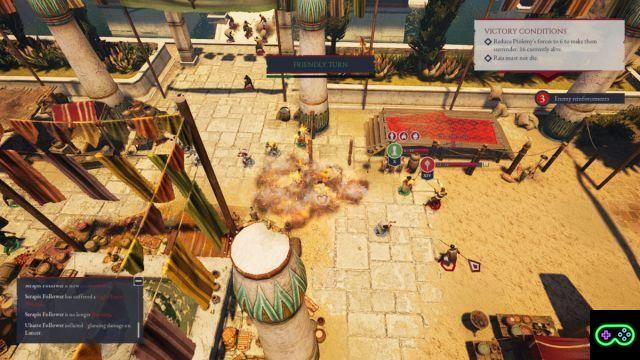
The fact that enemies often spawn in constant waves adds spice to any challenge, and above all motivates it player's effort to devise a winning strategy to complete his goal, to reach which head-on collision is not always the best solution: adopting diversions or spreading our forces on the field could prove to be the winning move to overcome an apparently insurmountable enemy barrier. Even the occasional allies can prove useful, as long as you do not abandon them to themselves and evaluate from time to time whether it is worthwhile to give them a hand or use them as a diversion.
Then there are more articulated missions, especially at the end of the 3 campaigns, in which we will have to divide our party into smaller groups, with different tasks: here unfortunately there is no way to fully understand the scope and danger of the individual missions, therefore the my advice is to form teams as balanced and varied as possible at the level of classes, to be ready to face any eventuality. Overall, party management and combat are undoubtedly the most successful aspects of the production, and they will be able to entertain you by offering you in most cases fun and almost never frustrating challenges.
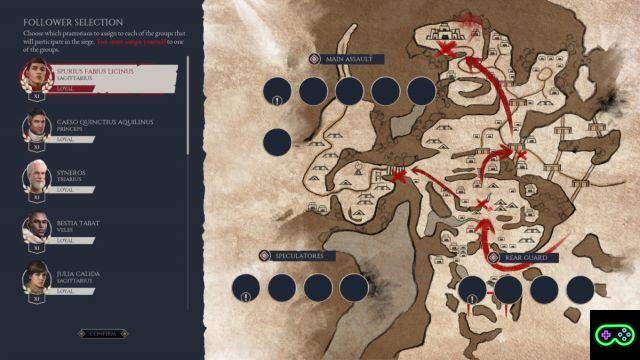
medium
To act as an intermediary between the world map and the battles with the party there are some intermediate tasks, which could be defined as exploratory: they consist precisely in venturing into the towns that we will conquer from time to time, places in which to undertake some kit activities, especially to be carried out in the form of dialogues with NPCs: maintaining relationships with the characters will not only advance the main plot, but can also give us access to secondary tasks, or simply provide us with more information about the background of our fellow travelers or other supporting actors.
In some situations we will be called to solve small environmental puzzles (in any case extremely guided), in others and take part in discussions for this or that alliance, which can be obtained or not depending on how we conduct the discussion and react to the unexpected. The variety is not lacking, although it all boils down to scrolling through dialogue lines and ticking a few options most of the time. You can still enjoy a pleasant artistic plant, marked by the realism of the architecture and, conversely, by a certain exasperation of the chromatic palette, with expressive intentions that have succeeded in giving each of the three continents explored a highly personal connotation.
Obviously, the Eternal City is not missing: in Rome we will return in the intervals between the campaigns, and obviously for the final phase of the adventure. Here the main plot points take place, pulling the strings of the decisions taken from time to time in Asia, Africa and Gaul. They are the most relevant moments in terms of narrative, but also more weak in terms of gameplay. The city is not freely explorable, we will be able to move only in specific locations, often extremely small, and even our actions will be limited to what is strictly necessary: to keep the events going. It is a pity that the developers have not been able to conceive anything more original, for example extra mini-games or simply secondary missions that would enhance the uniqueness of the location in question. Thus, the visit to Rome translates into a handful of screens in which to experience the few relevant events that form the glue between one chapter and another of the story. Sin.
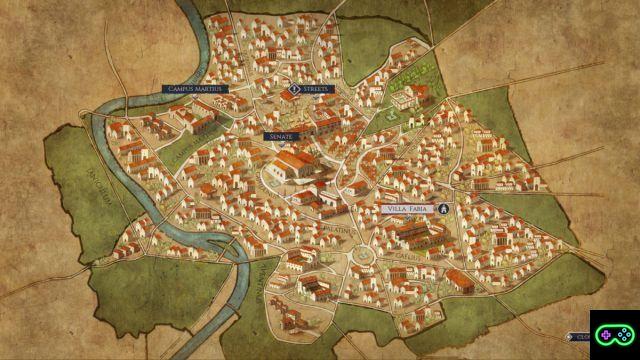
Despite the small or large defects that punctuate it, it is in the whole of its parts that Expeditions: Rome acquires completeness. True, none of his mechanics are particularly innovative, his writing is smooth but not memorable, the battles are rewarding even if not perfectly balanced, and the artistic sector fails to shine with its own light, even from the point of view of sound: a front of a dubbing that as mentioned is discreet, the soundtrack consists of a few themes with an accompaniment function, as effective as anonymous, despite the pleasant timbre of some unusual musical instruments, coming from the geographical areas visited in game, such as the Greek zither and the Persian flute. Limits undoubtedly children of its AA title nature, a production large enough to implement many mechanics, but not large enough to allow yourself the luxury of experimenting with them, developing them in an original way or simply refining them to obtain a perfectly balanced play experience.
And yet, it is a title with many merits: the mix of mechanics offers a good variety that compensates for the repetitiveness of some tasks; party battles are stimulating, demanding enough to always spur the player in search of the best tactics to overcome the enemy; the simplification of the RPG mechanics and the extreme scalability of the difficulty make it accessible for any type of player, even the total neophyte of the genre. It is a title that, taken for what it is, that is a decently average product, it knows how to amuse and entertain for a high number of hours, and which may constitute the premise for a future fourth chapter of the series truly capable of making the leap in quality towards excellence.
close
Expeditions: Rome is a good title with which to approach the tactical RPG genre: its not excessively complex mechanics and widely customizable difficulty make it a game within everyone's reach. At the same time it is a title with sufficient structural depth to make it satisfying even for the most seasoned players, as long as they are willing to turn more than one eye on the many, small defects that keep it below excellence. Anyone who is passionate about ancient history, and Roman history in particular, should not miss a title that will allow him to experience an epic story of war and revenge at the dawn of the Empire.




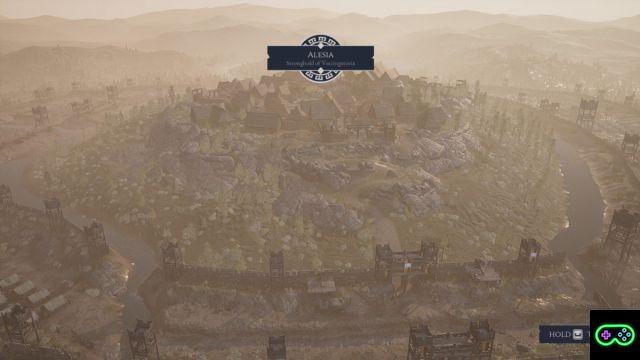
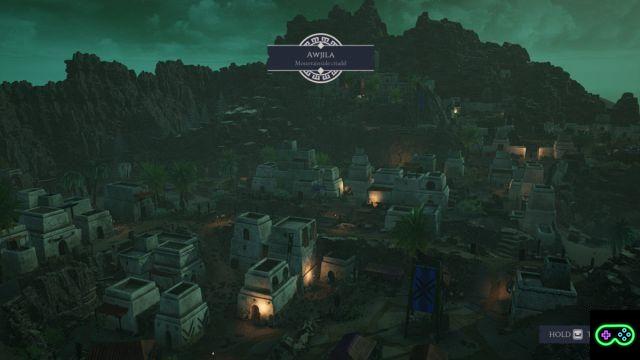
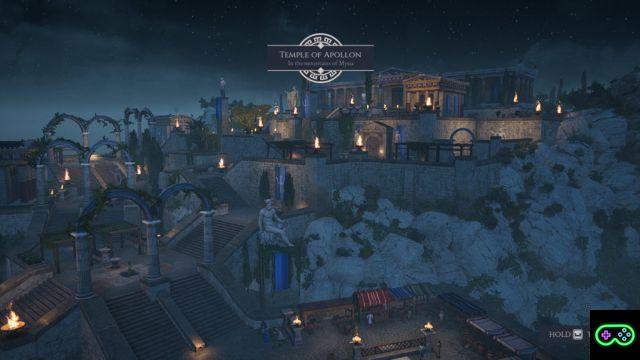
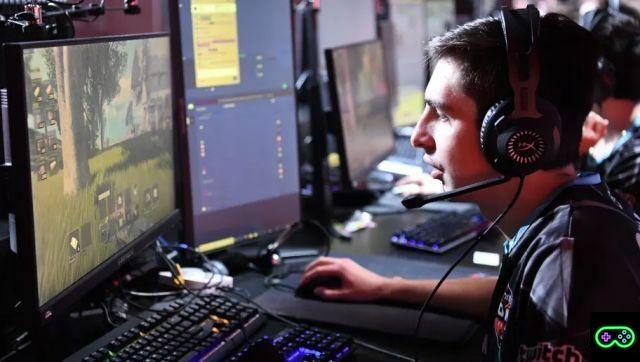
![[The Bear's Lair] God of War: Betrayal and Greek mythology](/images/posts/17432d3b12ecfec44b0b855d20c7520f-0.jpg)



